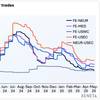The International Jack-Up Barge Owners Association (IJUBOA) held a general meeting in Brussels last month and agreed on actions that will achieve its mission of promoting the use of jack-up barges as safe and cost-effective solutions to a wide range of challenges.
Following two years hard work the Association has made substantial progress in the training and qualification of both current and future jack-up barge masters.
Accreditation of prior experience will preserve the “grandfather rights” of existing barge masters. After a practical and oral assessment they will receive a “Green Book” showing that they have reached the necessary standards. It will also provide a record of their growth in skills as the industry develops.
As a member of the UK Maritime Skills Alliance, IJUBOA is creating a skills and competence framework to meet the needs of barge crews and barge masters working on almost any type of jack-up barge or lift ship. This work will result in the “Red Book” – a training and development record kept by each individual from the time they join the industry.
Both the “Green Book” and “Red Book” will be controlled documents issued by IJUBOA. The individual holder will be responsible for reporting progress to be recorded on the master record.
Having trained and competent personnel on board will be an essential part of a company’s safety management plan. The IJUBOA’s developing Code of Practice will provide a framework against which independent external auditors can verify that plan.
The Code is modelled on the IMO’s International Safety Management Code. The Association recognises that full compliance with the ISM Code would not be right for all companies not already subject to it. More importantly, the relevant UK regulators recognise this too, and support the creation of an “ISM Lite.”
Work is now under way to determine what elements operators will have to be able to prove for their system to be certified as conforming to the code. The standard has to be high enough to be relevant and to satisfy potential customers and regulators around the world that jack-up barge operators are serious about safety. But it cannot be so high that no one can reach it. The bar needs to be set at the height that the best can meet, and the less than best can aspire to. Later versions of the code can then be used to raise the bar and improve safety in the industry.
The code will include a requirement for companies to have an accident reporting system and a way of learning and applying the lessons learnt – which many of them, of course, do already. It is only a short step to sharing those lessons with the rest of the Association. The members have accepted that the risks of revealing any weaknesses to their competitors are outweighed by the opportunities of learning from the mistakes of others, however this information will remain entirely confidentual. Although the discussions and details will be entirely confidential and kept within IJUBOA, national regulators will get an anonymous summary to assist in improving future safety procedures.
“The Association has reached a critical stage,” said John Howard, IJUBOA chairman. “We now know what we want to do, and how to go about it. Jack-up owners who join now will have a chance to influence the Code of Practice and how we define an “excellent barge-master” which will shape the industry for years to come.”










